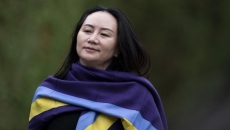The Liberals are setting aside $250 million over five years in a dedicated fund for rural transit, with the minister in charge saying the cash could be used for innovative on-demand services, not just traditional systems.
Federal infrastructure programs that help build or update transit systems have provided money to rural projects, but Infrastructure Minister Catherine McKenna noted they don't have a dedicated funding stream.
Whether you live in a city, small town, or remote community. Canadians want to get around in faster, cleaner and more affordable ways.
— Catherine McKenna 🇨🇦 (@cathmckenna) March 29, 2021
Canada's first Rural Transit Fund means:
🚌Better public transit
💻On-demand services
🚗Ride shares
💡Community-driven solutions pic.twitter.com/iVTAtbcdyb
McKenna said the government needs to make sure that transit funding considers rural communities, and is not solely focused on how to get people around major urban centres.
Rural communities often don't lend themselves to traditional mass-transit bus and subways systems, with more sparsely populated areas and residents who may travel out of town for work or school.
McKenna said there are some creative transit solutions that have caught the government's attention, from app-based on-demand services to ride-sharing arrangements.
"There are examples of clear opportunities and I think that we have to be innovative," she said in an interview.
"It's really looking at those opportunities, which can also be cost-effective, but provide better service."
McKenna said the effects of the COVID-19 pandemic mean that federal infrastructure dollars will also need to more quickly fund projects to keep rural communities competitive.
"In some of these communities, if you don't have good transit, it's a real disadvantage," she said.
"I hear from mayors. They say it's a disadvantage to attract investment because people want to go where you have good public transit, you're able to get around."
Speaking at a Monday press conference, Rural Economic Development Minister Maryam Monsef said the predictable funding should help small communities plan and implement ideas they have on the table.
The Canadian Urban Transit Association welcomed the funding, saying rural communities' transit needs have often been overlooked through programs designed to serve big cities.
Ray Orb, head of the rural forum for the Federation of Canadian Municipalities, called the funding a good first step in recognizing the unique needs and capacities of rural communities.
The funding announced Monday is part of $15 billion in planned transit spending over eight years, the details of which the Liberals have rolled out over the last few weeks.
The Liberals are promising billions in permanent transit funding as part of a post-pandemic recovery, including $3 billion annually in a transit fund starting in five years.
There are expectations the government will roll traditional infrastructure spending into its coming budget to help with an economic recovery from COVID-19.
The Liberals have a $188-billion, 12-year infrastructure program — about half of which is funding created by the previous Conservative government — that the current government hoped would aid in economic growth.
Last week, the federal auditor general warned that holes in reporting and delayed spending put the overall program at risk of falling short of its goals.
"There's more we can be doing and I think there are lessons learned," McKenna said. "Every taxpayer dollar has to get multiple outcomes, and that is more important than ever."






